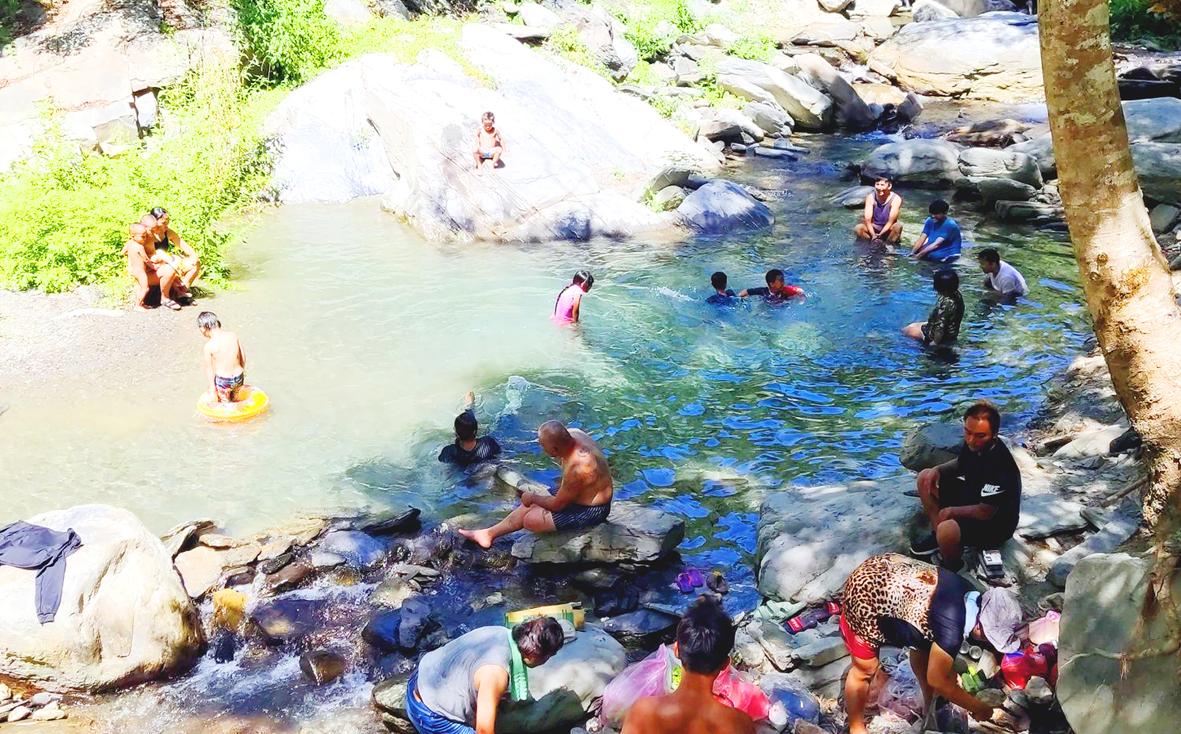As reports of heat illness have increased due to high temperatures across the nation, an emergency-room physician said that four types of medicines might also contribute to increased risks of heat-related illness.
Wei Chih-wei (魏智偉), director of the emergency room at Tung General Hospital in Taichung, said that as many people are traveling and enjoying outdoor activities in the summer, they should take preventive measures to minimize the risk of heat-related illness, including heatstroke and heat exhaustion.
According to Ministry of Health and Welfare data, 181 emergency rooms have reported 659 visits for heat illness from July 1 to Friday, which is 1.8 times higher than the 370 visits reported in the same period last year.

Photo provided by a member of the public via CNA
As of Friday, 1,722 emergency-room visits for heat illness have been reported this year, which is about 40 percent higher than the 1,248 visits reported in the same period last year, the Health Promotion Administration (HPA) said in a news release yesterday.
Wei said that the most severe heat illness was heatstroke, which is caused by prolonged exposure to high temperatures and when the body’s ability to regulate heat is overwhelmed, leading the body temperature to rise to 41.1°C or higher.
Early symptoms of heatstroke might include dizziness, headache, nausea, tiredness or rapid breathing, Wei said, adding that without immediate treatment, a person could experience an altered mental state or confusion, agitation, delirium, loss of consciousness, seizure, vital organ damage and even death.
“While elderly people, children, people with chronic diseases or excessive alcohol use have a higher risk of heatstroke, some medications also affect the body’s ability to regulate its temperature, causing increased risk of heatstroke,” he said.
Wei said that anticholinergic drugs — such as antihistamines for treating congestion and some drugs for treating the symptoms of Parkinson’s disease — could stop the activation of sweat glands, while sympatholytic drugs, such as caffeine and ephedrine, could cause blood vessels to narrow and increase metabolic heat production.
Some types of drugs used to lower blood pressure, such as beta blockers and calcium channel blockers, could reduce the cardiovascular system’s ability to regulate temperatures, he said.
Other drugs, like antidepressant and antipsychotic medications, could reduce sweating and disrupt the body’s ability to reduce its core temperature respectively, he added.
Wei said that people who are taking these four types of medicine should drink plenty of water, wear a hat or use parasol under the sun, and avoid abruptly discontinuing their medication.
The HPA also says that people should drink at least 2 liters of water per day and drink frequently when outdoors, not only when they feel thirsty.
People should also drink at least 500ml of water every 30 minutes if they are working or exercising outdoors, it said.
It also recommend that people avoid outdoor activities between 10am and 2pm, take preventive measures against sun exposure if they must go out during these hours, and leave a high-temperature environment and seek immediate medical treatment if they begin to show symptoms of a heat illness.
Additional reporting by Yang Yuan-ting

Taiwanese can file complaints with the Tourism Administration to report travel agencies if their activities caused termination of a person’s citizenship, Mainland Affairs Council Minister Chiu Chui-cheng (邱垂正) said yesterday, after a podcaster highlighted a case in which a person’s citizenship was canceled for receiving a single-use Chinese passport to enter Russia. The council is aware of incidents in which people who signed up through Chinese travel agencies for tours of Russia were told they could obtain Russian visas and fast-track border clearance, Chiu told reporters on the sidelines of an event in Taipei. However, the travel agencies actually applied

Japanese footwear brand Onitsuka Tiger today issued a public apology and said it has suspended an employee amid allegations that the staff member discriminated against a Vietnamese customer at its Taipei 101 store. Posting on the social media platform Threads yesterday, a user said that an employee at the store said that “those shoes are very expensive” when her friend, who is a migrant worker from Vietnam, asked for assistance. The employee then ignored her until she asked again, to which she replied: "We don't have a size 37." The post had amassed nearly 26,000 likes and 916 comments as of this

New measures aimed at making Taiwan more attractive to foreign professionals came into effect this month, the National Development Council said yesterday. Among the changes, international students at Taiwanese universities would be able to work in Taiwan without a work permit in the two years after they graduate, explainer materials provided by the council said. In addition, foreign nationals who graduated from one of the world’s top 200 universities within the past five years can also apply for a two-year open work permit. Previously, those graduates would have needed to apply for a work permit using point-based criteria or have a Taiwanese company

The Shilin District Prosecutors’ Office yesterday indicted two Taiwanese and issued a wanted notice for Pete Liu (劉作虎), founder of Shenzhen-based smartphone manufacturer OnePlus Technology Co (萬普拉斯科技), for allegedly contravening the Act Governing Relations Between the People of the Taiwan Area and the Mainland Area (臺灣地區與大陸地區人民關係條例) by poaching 70 engineers in Taiwan. Liu allegedly traveled to Taiwan at the end of 2014 and met with a Taiwanese man surnamed Lin (林) to discuss establishing a mobile software research and development (R&D) team in Taiwan, prosecutors said. Without approval from the government, Lin, following Liu’s instructions, recruited more than 70 software